Blue
Intergenerational Peep: Aberdeen
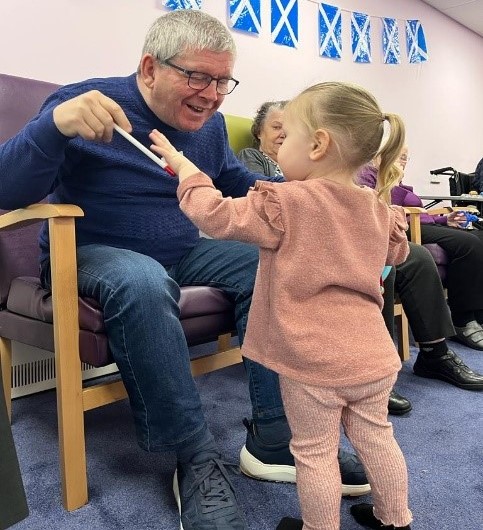 Intergenerational Peep in a day centre or care home for older people is like a typical Peep group but with icing on top – all the usual fun and learning benefits for children, parents, carers and practitioners, but with an extra layer of local older participants. Here’s an insight from Peep practitioners in Aberdeen:
Intergenerational Peep in a day centre or care home for older people is like a typical Peep group but with icing on top – all the usual fun and learning benefits for children, parents, carers and practitioners, but with an extra layer of local older participants. Here’s an insight from Peep practitioners in Aberdeen:
"Peep Aberdeen recognised the opportunity of coming together with the older adults in our communities and the benefits intergeneration Peep could have for the participants. We partnered up with Bon-Accord Care to create an age inclusive Peep group whereby toddlers and older adults alike can make social connections to enhance their well‑being and self-confidence.
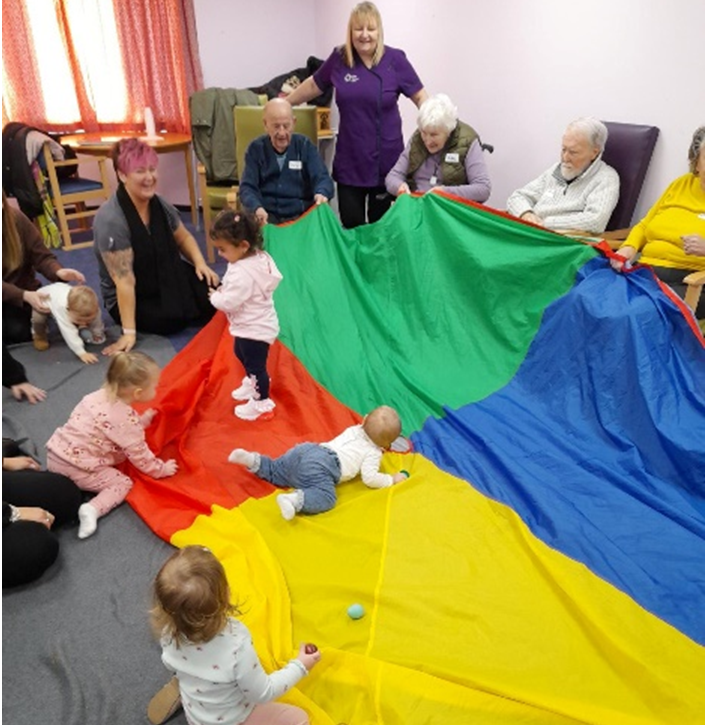 The group has been running with great success for the past six weeks. Over this time we have explored a range of topics from our Peep Learning Together programme including Musical interactions and Balance and co-ordination. We celebrated Valentine’s Day and Burns Night with some crafts which everyone enjoyed. Most recently we practised our balance and co-ordination, walking along the balance beam and throwing beanbags into the box. Both children and adults showed fantastic support and encouragement to one another during the activities.
The group has been running with great success for the past six weeks. Over this time we have explored a range of topics from our Peep Learning Together programme including Musical interactions and Balance and co-ordination. We celebrated Valentine’s Day and Burns Night with some crafts which everyone enjoyed. Most recently we practised our balance and co-ordination, walking along the balance beam and throwing beanbags into the box. Both children and adults showed fantastic support and encouragement to one another during the activities.
During each session we share lots of songs, including classic nursery rhymes our older adults remember from their own childhood.
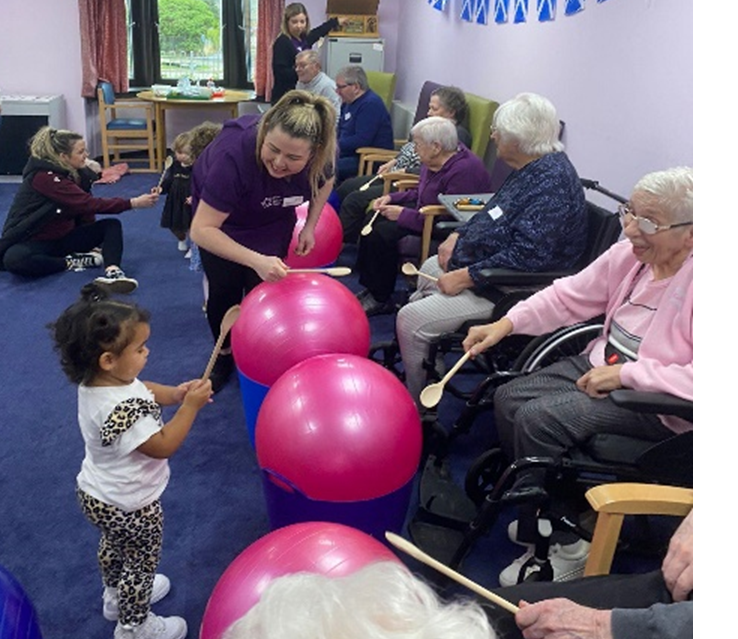 Following our busy activities, we gather around and listen to a story, which one of our older friends enjoys reading to everyone."
Following our busy activities, we gather around and listen to a story, which one of our older friends enjoys reading to everyone."
'Love the group, it's great for the community' - parent
'I have had a great day, I am so happy to see the children' - older adult
'So nice to see children interacting with the older generation' - parent
'Coming together singing familiar songs is my favourite bit' - older adult
'We adore our intergenerational Peep group! It's by far our favourite group of the week. My daughter is very sociable but she has come on leaps and bounds since attending Peep. She gets to play and chat with her friends and so do us mums, it's just great. I enjoy my cup of tea with the residents after the class and it feels like I’m having a catch up with friends. We would come everyday if we could.' - parent
“Intergenerational practice is inclusive, building on the positive resources that the younger and older persons have to offer to each other and those around them.”
Beth Johnson Foundation (a charity dedicated to making the UK age-friendly)
Feature box colour:
Infographic: thanks to Global Intergenerational Week Ireland (www.giwireland.com)
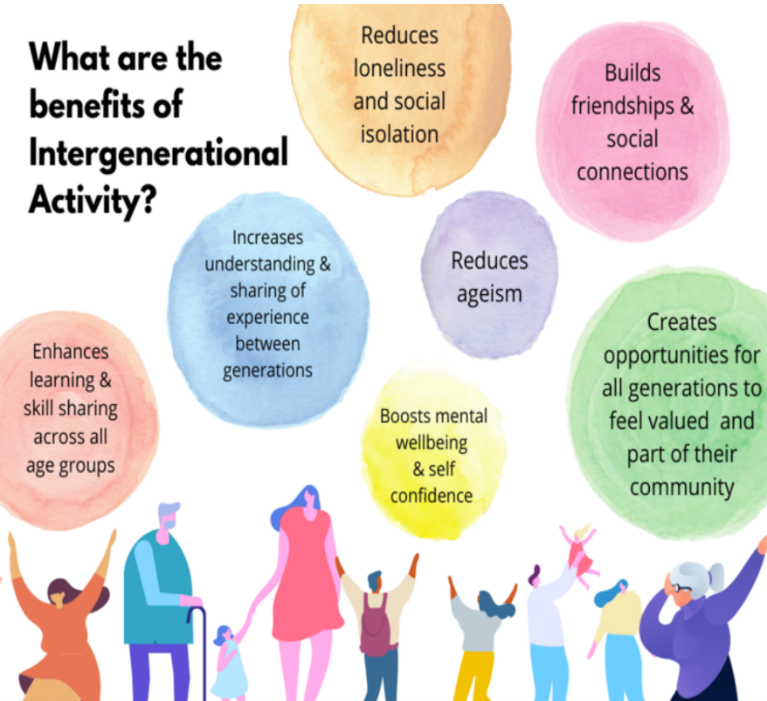
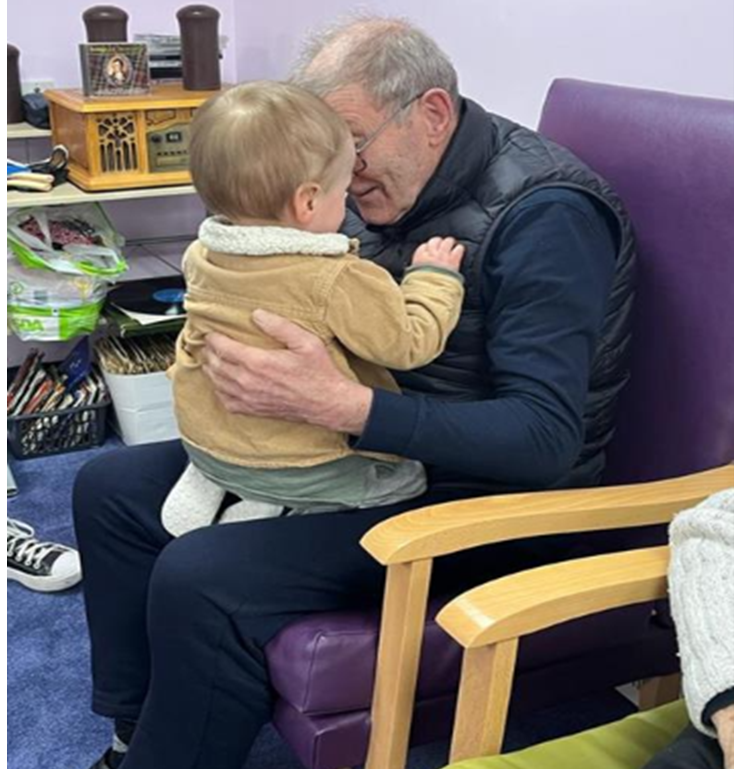
Side Quote Color:
help us spread the word about Peep
We are making some short videos to share online with those who are new to Peep sessions and the charity Peeple - parents/carers and people working with families. We’d love to include some short clips from parents and professionals who are already familiar with Peep - saying what you like about it, and what difference Peep has made to you and your family or the families you work with. Seeing ‘real’ people talking about Peep helps bring it to life more than a leaflet can!
If you’d like to record and send us your thoughts on Peep, please do the following:
- Click the link to read and complete the Consent form
- Record a video on a phone – it could be recorded by you or a friend or practitioner, at home, at work, or before/after your Peep session. See below for some Tips for filming on a phone and click this link to see a clip from a Peep parent as an example.
- Share your video with us on our private and secure Dropbox account - please click here to access the Peeple Dropbox folder, which will prompt you to upload your video from your device. Dropbox will also ask you for your name and email address – please add your locality after your name (e.g. Jo Bloggs – Edinburgh), so that we can match up videos to consent forms. (Within Dropbox, your video and your name and email address will only be visible to the Peeple video-making team.)
Tips for filming about Peep on your phone (or download the Tips)
- Keep the phone steady by balancing or propping it up on something.
- Make sure there is nothing in the background that you wouldn't want on film, especially personal information.
- Be well lit from the front, natural light is best.
- Try to keep your head and shoulders in shot, ideally landscape view (phone sideways).
- Have an idea of what you are going to say about the impact Peep has had (it doesn't have to be scripted).
- Remember to introduce yourself, including your role, e.g. Parent with toddler, or Outreach worker using Peep in Stay and Play, etc
- Hit record and go - it's great if you start with a smile and look at the camera

Thanks for your time - do get in touch if anything isn't clear or you have any questions: support@peeple.org.uk or tel 01865 397976.
Feature box colour:
Side Quote Color:
how peep supports the home learning environment
The evidence-based Peep Learning Together Programme supports practitioners and parents* with young children’s development and learning, making the most of their earliest years and helping to improve later outcomes. It is widely used across the family support and early years sectors, including Family Hubs. Find out below how our Peep programmes support children's outcomes through a strengths-based approach to working with families, supporting staff development, and providing comprehensive and flexible resources that can be used in universal and targeted delivery.
Peep sessions raise parents’ confidence and awareness about:
- the value of their role and their relationship with their child,
- the simple things they can do in day-to-day life to support learning, and why these things make a difference.
There is compelling evidence that these two interconnected things, sometimes known as the Home Learning Environment (HLE), are fundamental to a good start in life. The human brain is built not born – the 100 billion brain cells that we are born with need to be connected up. Most of these connections are made during the first months and years of life, and are heavily influenced by the child’s relationships and experiences during this period. It's never too late to make a difference but it makes sense to get involved as early as possible. Increasing parents’ understanding contributes to preventative early intervention or more targeted later intervention, helping to narrow the attainment gap in society that is already apparent before children start school.
'The Peep course has really helped my family to bond. We play together much more often.' Peep parent
The Learning Together Programme is comprehensive, with five strands of learning which complement the EYFS (Early Years Foundation Stage) and other early years frameworks: Personal, Social and Emotional Development, Communication and Language, Early Literacy, Early Maths, and Health and Physical Development. Practitioners who attend the 2-day Peep Learning Together Training are given online access to 74 child development topics (each with downloadable session plans and parent handouts), along with extensive implementation support.
Evidence-base:
Peep programmes have been evaluated in a number of independent research studies by the Universities of Oxford, Queen's Belfast and Warwick. These show that Peep:
- helps children develop strong foundations for language, literacy and self-esteem – improving outcomes for all, but with the greatest impact on the most disadvantaged
- successfully reaches families and engages them in their children’s learning
- helps parents become more aware of their children’s development and how to foster it
- enables practitioners from a wide range of professions develop new skills and fresh approaches to unlock parents’ potential, rather than focus on their problems.
'Since I started Peep I talk more with my daughter about what is in the book we are looking at – not just the words. We sing loads and I am beginning to feel more confident with messy play.' Peep parent
The evidence-based Learning Together Programme (LTP) was developed for practitioners to use with parents and their children from birth to school. Increasing parents’ understanding contributes to preventative early intervention or more targeted later intervention, helping to narrow the attainment gap in society that is already apparent before children start school.
'Peep provides a very clear structure to provide key messages and support around learning in the home to parent/carers. The programme content and resources are very comprehensive and of a high standard, and can be delivered flexibly. The training was fun and interesting, with very engaging and experienced trainers. I feel really motivated to start delivering Peep in our locality, along with Family Hub colleagues across Hull.' Catherine, Early Help Team Manager, Hull City Council Family Hub
How the Peep Learning Together Programme is used with families to support children’s outcomes:
Valuing and building on what parents already do:
Peep is a strengths-based approach to working with families. Key child development ideas are discussed during Peep sessions, including how the ideas relate to families’ experiences. Children’s behaviour, for instance, can become easier for parents to manage or re-focus when they understand a bit more about possible causes. The topic on schemas can provide alternative activities for a child who is exploring throwing things, while ‘Mark making’ helps explain why a child might be swirling their food on the table, and suggests other ideas for making marks (sand, mud, playdough, paintbrush and water on the ground, etc). The combination of information with practical ideas helps restore parents’ own patience whilst providing their child with more opportunities to develop their skills through play.
Peep sessions also include songs and story time, and simple, low-cost play and talk activities that can be continued at home. When parents understand more about the benefits of singing, talking, playing and sharing books and stories with their baby or child, and share simple ideas for incorporating them into everyday life, they tend to do more of these valuable activities.
'Peep was very informative and interactive. It has made me more comfortable and confident as a parent. More importantly, I now understand my kids better than before being involved in the sessions.' Peep parent
Delivery format:
The Peep Learning Together Programme was designed to be used flexibly, to suit the needs and interests of all families. Peep sessions can be delivered in groups, in drop-in sessions (e.g. Stay and Plays or child health clinic waiting areas), or in the home or other one-to-one sessions. They can take place indoors, outdoors or online. Peep practitioners (two co-facilitators or a session leader and assistant) decide on the number of sessions in a Peep course, and which of the child development topics to focus on, involving parents' preferences as appropriate.
'Peep was very good. Learnt a lot about the importance of praise and positive feedback, my impact, body language, etc.' Peep parent
Strengthening relationships:
The Peeple principle that ‘relationships are at the heart of learning’ underpins both the practitioner training and Peep sessions with families. Several of the Programme topics focus specifically on supportive and loving parent-child relationships, but nurturing and reflective care underlies all Peep sessions. Practitioners use the ORIM framework to identify Opportunities, Recognition, Interactions and Modelling that parents are doing with their children, building their knowledge and confidence, and helping to strengthen their relationships. Parents are encouraged to share ideas and activities from the session with other family members at home.
In feedback, parents often comment on how much they appreciated the friendships and peer‑to-peer support networks that they and their children develop:
'The discussions within the session – it is never rushed or brushed past. Honest conversations with other parents made me feel better on days where I’ve wondered if it was just me feeling a certain way. The staff are very welcoming and put you at ease.' Peep parent
Universal delivery and accessibility:
In our experience, families from all walks of life benefit from getting to know other families and practitioners, sharing practical ideas and experiences with each other, and finding out about other local services. Being seen to be open to all families can reduce the stigma that is sometimes associated with ‘parenting’ groups. The focus in Peep sessions is on supporting children’s learning and development, which also helps with parents’ sensitivity. As a society we're gradually recognising that groups for parents and children are beneficial for all families. Cross-sector support such as that provided by Family Hubs can really help break down barriers.
Targeted delivery:
Peep programmes can be used or adapted for families with similar needs or circumstances if helpful, such as young parents, dads, foster carers or kinship carers, children due to start nursery or school (transition or school readiness), families with English as an additional language (EAL), parents with post‑natal depression or anxiety, children with delayed speech and language, families with a parent in prison, traveller families, childminders, or families whose children have additional support needs (SEND), etc. While some parents prefer to go to a group that is open to all, others would rather start off with parents that they feel they have more in common with.
Course content can be targeted by age/ developmental stage and/or one or more of the five strands of development. Some Peep practitioners have added in elements that appeal to the families they are working with, such as Peep in the Pool, Cooking Peep or Outdoor Peep. Peep programmes can also be used to complement or follow on from other provision, such as Baby Massage or Peep Antenatal courses, or transition sessions into early years settings.
'Because of Peep I am always looking for opportunities to help my child learn and get new experiences.' Peep parent
Sharing ideas with families beyond direct delivery:
We post Peep activity ideas and tips that support the home learning environment on our Peeple social media platforms (Twitter, Facebook and Instagram, all @PeepleCentre). These are used by parents and practitioners. Peep practitioners can also share Peep handouts on their own social media pages or online groups (e.g. via Whatsapp), as well as printing them.
Quality Assurance and workforce development:
Peep programmes and delivery are quality assured by:
- our evidence-base, findings from wider research, and our delivery model, described in our theory of change,
- our regularly monitored and reviewed training courses, which focus on enhancing practitioners’ theoretical and practical skills, knowledge and understanding about working with parents to support their children’s development,
- the comprehensive, high-quality Programme resources available to all trained practitioners,
- reflections from our own practitioners, and practitioners we have trained around the UK, Ireland and Australia over the past couple of decades, along with those of the families they have worked with,
- accreditation units available to both practitioners and parents,
- post-course delivery support and sharing of best practice, available to Peep practitioners and organisations, including monthly online practitioner support sessions, Peep Champions network, delivery support newsletters, practitioner Facebook group, refresher training, and Members Area on our website.
‘Peep is fantastic for involving parents in their children's learning. It gives parents more confidence to support their children's learning and take it forward at their child's pace and development level.’ Children’s Centre family support worker
Sustainability, value for money and a joined-up approach for organisations:
We have trained practitioners from numerous settings and backgrounds, such as family hubs, children's centres, nurseries, pre-schools, schools, health centres, early help, libraries, family learning, psychology, social care, public health, prisons, museums and community centres. As a charity, we have always prioritised making the training affordable and great value for organisations, providing on-going access to both the Programme materials and delivery support.
Practitioners can be employed or volunteers, including parents who have gone on to become Peep practitioners, sometimes after completing the Peep Progression Pathway accreditation. Peep delivery can be an opportunity for practitioners from different sectors to work together, sharing their complementary skills and experience with families and each other.
‘I find Peep a huge benefit to both myself and the adults that I work with. It's good fun, factual, and understanding that everyone is in the same boat and trying to be the best parents they can be, and that we can support each other.’ Early childhood practitioner, nursery class
* For readability, we use the term ‘parents’ to refer to family members and others with a key caring role.
If you're part of a Family Hub or an organisation working with families, find out more:
> Peep Learning Together Programme
> Peep Learning Together Programme 2-day Training for Practitioners
> Arrange a free Information Briefing for managers and decision-makers
> Arrange In-house Training (online or face-to-face)
> Watch our video 'How Peep Programmes can support your work with families'
Feature box colour:
find out more or book training
tel 01865 397 970
training@peeple.org.uk
> training courses
> dates & booking
> in-house training
> sign up to our e-newsletter
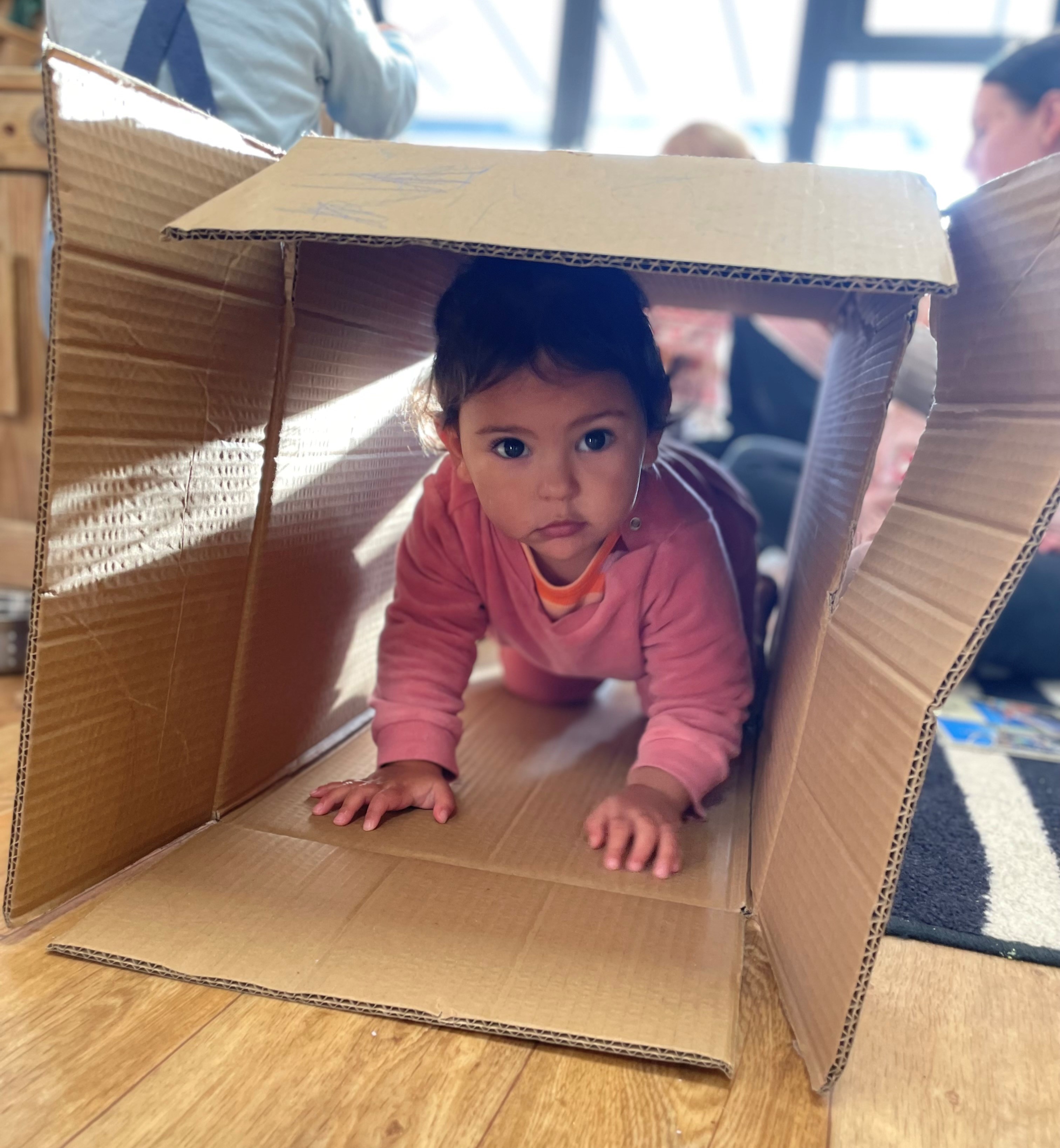
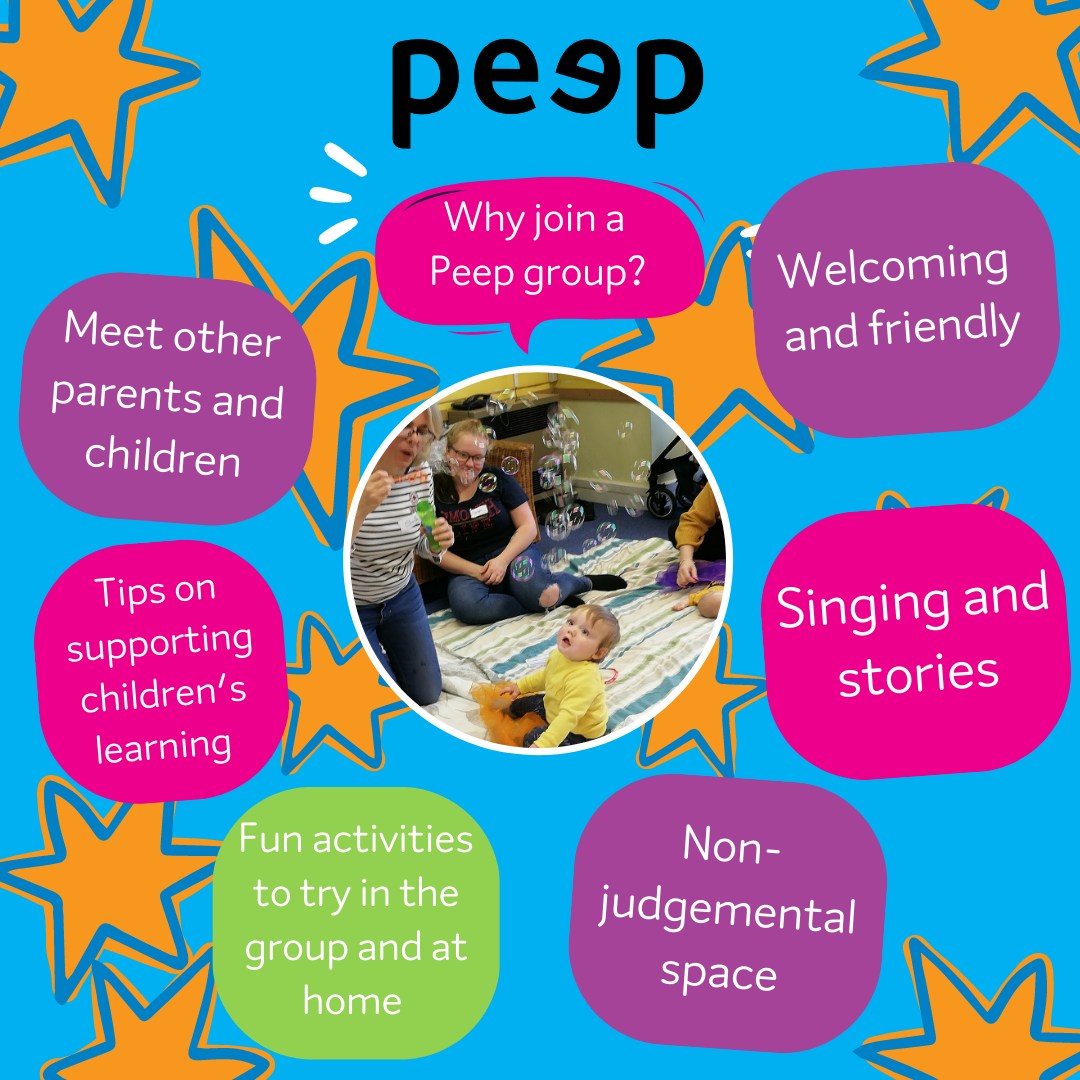
Side Quote Color:
Parenting is... complicated!
Parenting can be tough! Which is why we don’t judge or tell people what they ‘should' do, we simply encourage & build on what families already do.
Contact your local children's centre, family centre or family hub if you'd like to see if there's a Peep group near you.
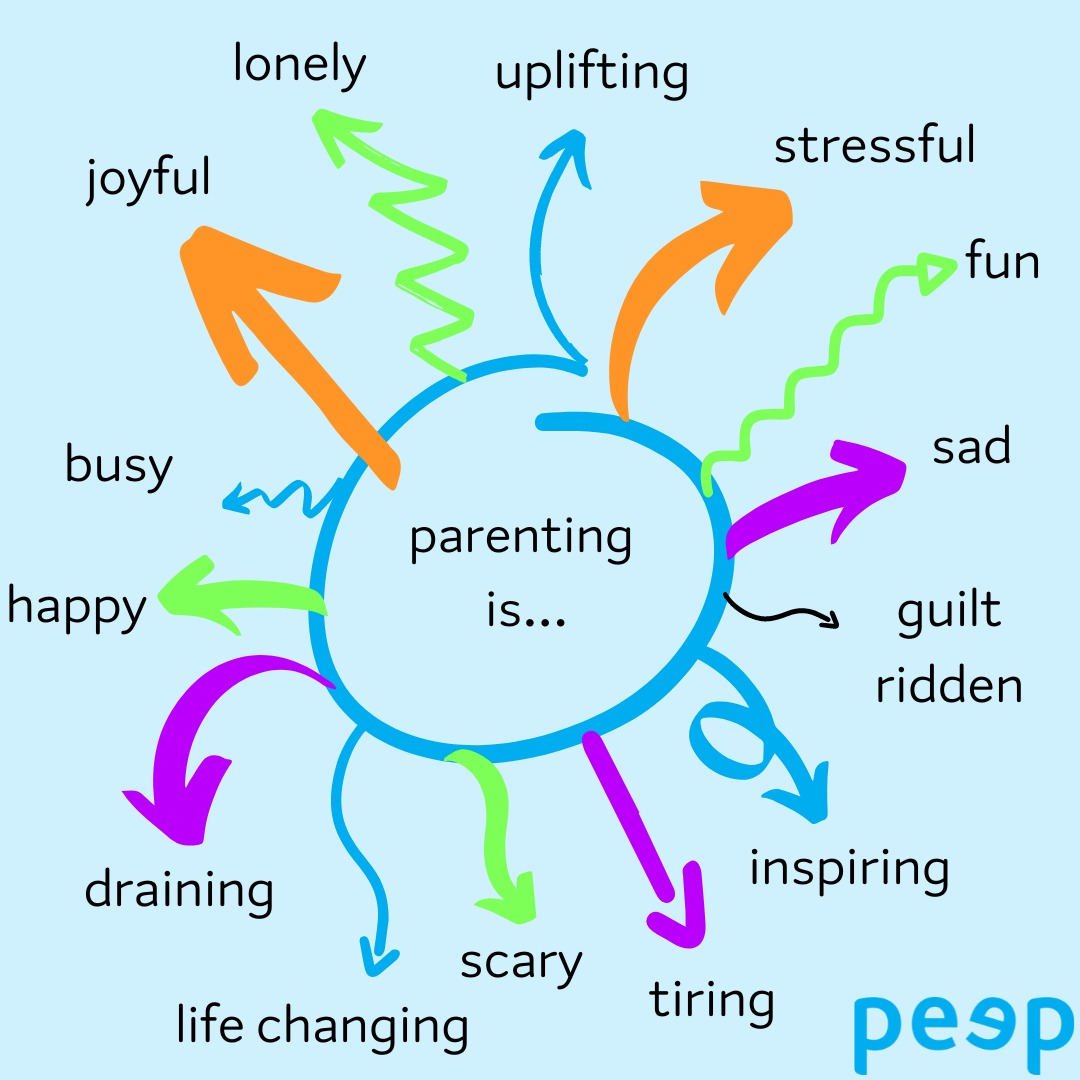
Feature box colour:
Side Quote Color:
Talking with your baby
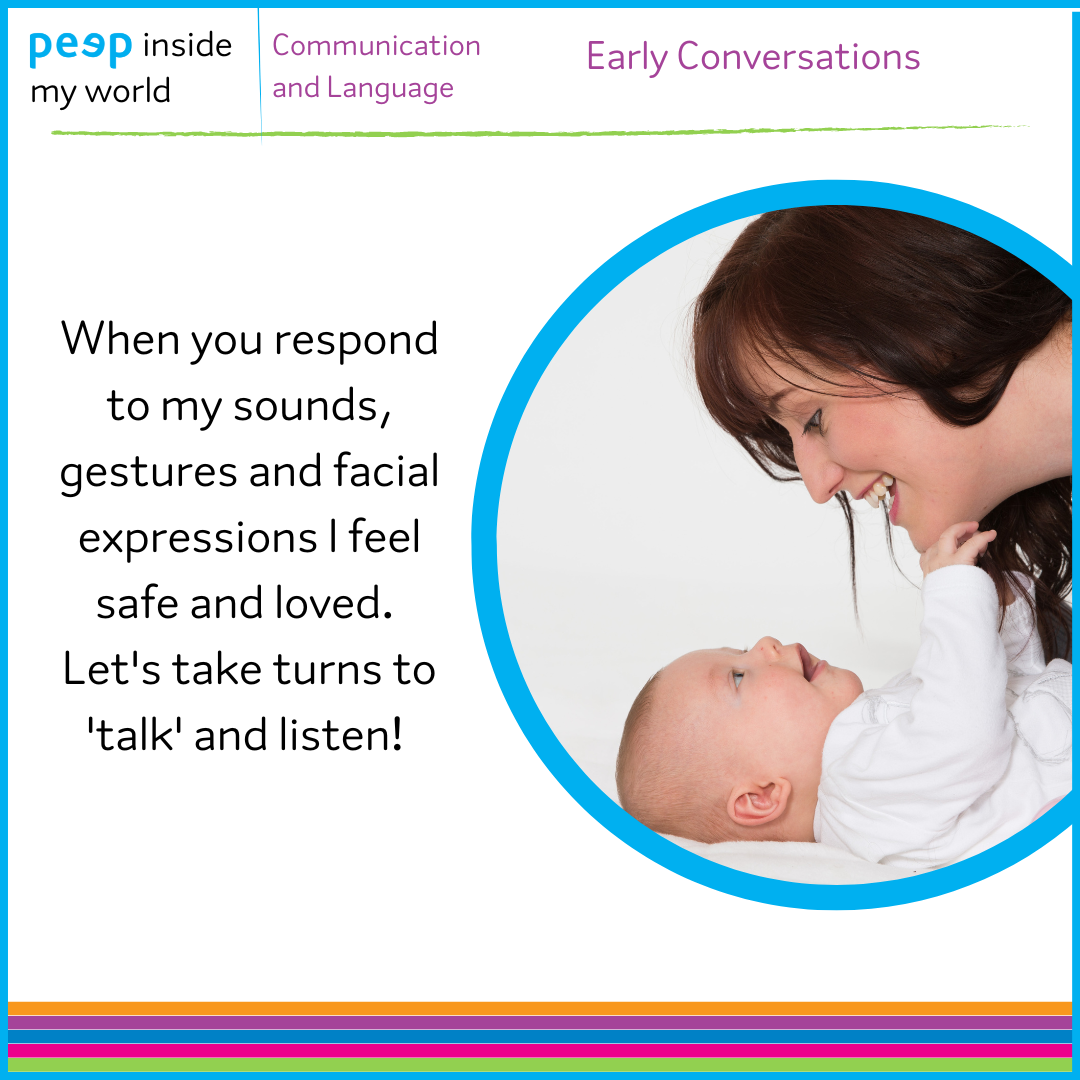 Babies 'talk' more and more when others respond to them - this is how they learn.
Babies 'talk' more and more when others respond to them - this is how they learn.
Try copying your baby’s cooing sounds or facial expressions. Watch and listen for their responses and leave gaps in the conversation so that your baby has time to answer you in their own way.
Feature box colour:
Side Quote Color:
Blog: Everyday play with free, everyday things
Have you ever found that your child is more interested in the box that a toy came in, than the toy itself? It’s a common theme! When we think of toys for children to play with, we often think of shop-bought toys that ‘do’ something, but young children have an inborn curiosity which means that exploring everyday objects is just as exciting to them.
Play develops important life skills like talking and listening, and social skills including learning to share and take turns, as well as confidence. Playing with our children is a fantastic investment of our time as parents, as it also helps deepen bonds and feelings of security.
Children love exploratory play, experimenting with physical objects from the world around them, and when we harness this curiosity together, it might surprise you what fun you can have. Below is a list of some everyday objects and ideas for how they can be used in play - all these things are free or can often be found around the home. If you don’t have the suggested item just swap it for something you do have. The most important thing is having fun!
play ideas for everyday objects:
Towel: den, trampoline for bouncing soft toys up and down, picnic blanket for a teddy bears picnic, duvet for sleepy dolly, cape for a superhero, peekaboo, tug of war.
Plastic milk carton: watering can (make holes in the lid), shaker, measuring jug for water play/ bath time, plant pot (cut the top half off), house for small world play (cut a door in the side)
Colander: drum, water play, story prop (makes a great space helmet!), post box for dry spaghetti developing small finger movements (fine motor skills).
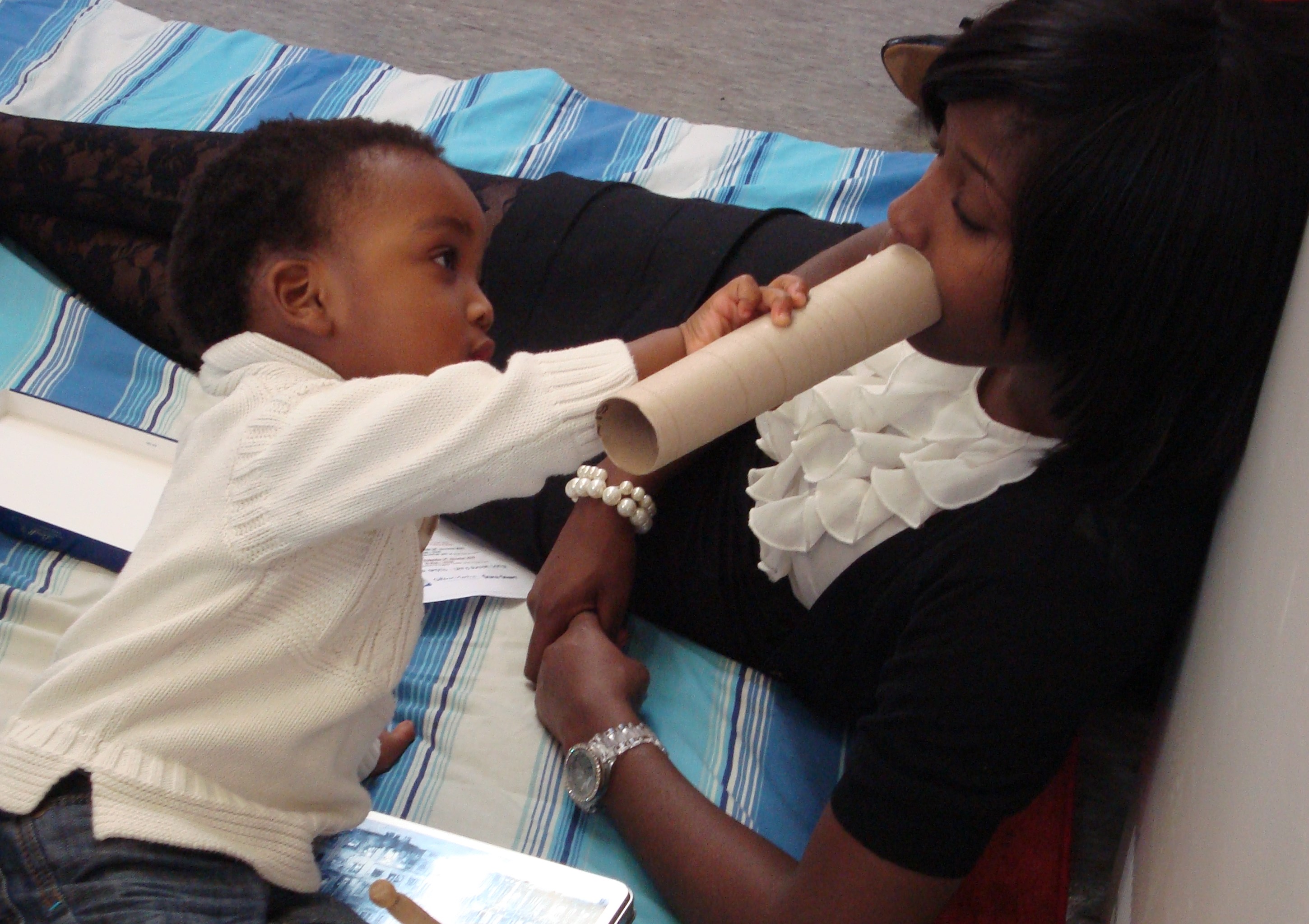 Kitchen rolls or toilet rolls: telescope or binoculars (stick two together), car park for miniature cars, megaphone (sorry parents!), tunnel, bandage for teddy’s sore arm.
Kitchen rolls or toilet rolls: telescope or binoculars (stick two together), car park for miniature cars, megaphone (sorry parents!), tunnel, bandage for teddy’s sore arm.
Egg carton: treasure chest, seedling planter, colour sorter, paint tray, building blocks.
Leaves: leaf rubbings, sensory play (crunching), colour sorting, small world hide and seek, paint stencil, outdoor pictures and nature art.
Laundry basket or big box: goal for paired up socks, vehicle (racing car, speed boat, carriage), ball pit, reading nook (add favourite books and blankets for extra cosiness).
nursery rhyme props:
Grand Old Duke of York: bang on a pan or empty box with a spoon (or hands) for the marching beat
Row, Row, Row Your Boat: sit opposite your child and use a scarf or a towel to pull each other back and forth
Zoom, Zoom Zoom, We're Going to the Moon: a colander on the head makes for a great intergalactic helmet!
London Bridge is Falling Down: build with cushions, egg boxes or empty margarine tubs…and enjoy knocking them down!
Whilst exploring these objects, your child will also be developing their early science and maths thinking and skills, even before they have the words to describe what they’re doing. It’s fascinating! It’s always worth keeping in mind, this year more than ever, that children don’t care how much toys cost, it’s your love and attention that mean the most to them.
Feature box colour:
Side Quote Color:
Playdough recipe
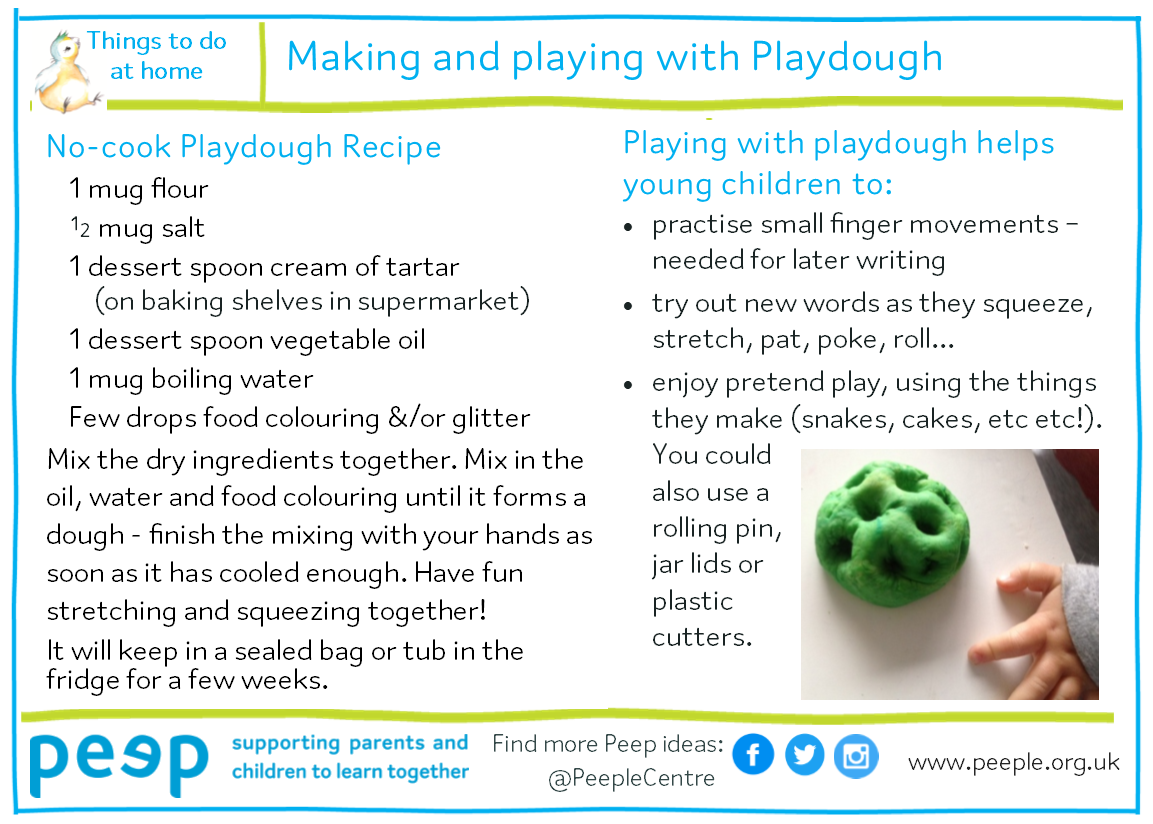
Feature box colour:
Side Quote Color:
6 ideas for playing outside
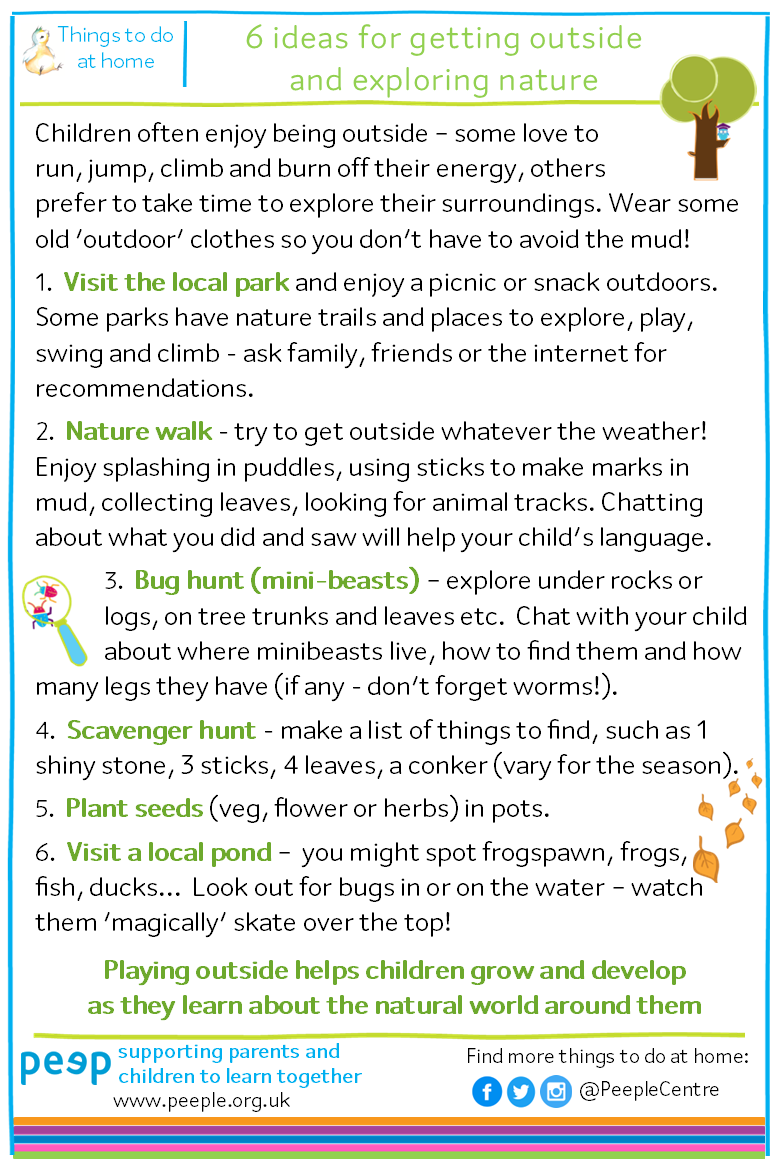
Feature box colour:
Side Quote Color:
relationship and confidence building in Liverpool
This case study focuses on a Mum experiencing breastfeeding issues, anxiety and isolation, and her daughter Millie (not her real name; aged 2-11 months during the case study). The range of inter-linked support she received from Peep and other practitioners and families in her local Liverpool Children’s Centres highlights the value of such a connected, joined up approach.
How identified for Early Help:
Mum came in as a referral from the doctor, and wanted support with breast feeding. Mum was also experiencing other challenges that emerged during our conversations at the Children’s Centre (in italics below); the support we offered, and the impact for mum and daughter are described in the bullet points.
Support provided and impact:
Mum needed breast feeding support, as she could not get her baby Millie to latch on.
- Our Health Promotion Worker went out on a home visit to give her tips, and then Mum was able to breast feed confidently, using the techniques she had learnt.
Mum was a single parent, who felt quite isolated. Dad lives abroad and didn’t want any contact with Millie. Mum had never wanted a baby and when she fell pregnant she started feeling very anxious, which became worse when Millie was born. The doctor had mentioned medication, but Mum wanted to conquer her feelings on her own.
- Mum was encouraged to attend the Peep Baby Babble group, which she really enjoyed. At first she was quiet, but the friendly and supportive format of the group helped her confidence grow, and she started to join in the discussions more. Mum was anxious at first and didn’t want to put Millie down. With encouragement she gradually began allowing Millie to explore independently and her anxiety became much better.
- Baby Babble and encouragement from staff and other families acted as a stepping stone to trying other groups in the Centre, and she started attending both Baby Massage and the Stay and Play group regularly.
- Mum has made friends that she meets up with, outside of the Centre. She feels less isolated.
Strengthening relationships and understanding of how to support her child's development
Mum lacked confidence, as she wasn’t sure about child development and what milestones her baby should be meeting. This led to arguments with family members, when they made comments about Millie’s development. This also upset Mum and made her worry.
- Mum has a better understanding of Millie’s milestones, from what she has learnt during the Baby Babble Peep sessions. She’s enthusiastic about the help she has received and said what a difference the Centre and the Peep sessions have made to her life:
“I really enjoy coming to Baby Babble Peep and it has brought on my daughter so much. As a parent I feel this group has really helped me with my confidence and I have made friends. I look forward to what I will learn in our classes. I like the handouts we get too, and keep them in a memory box with all the things I’ve made with Millie during the sessions.” - We have covered topics during Peep when Mum has been concerned about aspects of Millie’s development, such as her speech and her physical skills. Mum said that this has made her more confident, especially when family members have made comments about Millie’s development.
- Mum has a better relationship with her family, as she can confidently say that she knows about Millie’s development, and challenge when family members comment that she is behind or she should be doing more.
Increasing mum's own confidence, learning and employability
Mum needed support in getting back to work. However, she was scared about leaving Millie with anyone else and was putting a lot of pressure on herself.
- Mum is attending a Confidence Building course at the moment, at one of our children’s centres, to develop her confidence further. She is due to attend a First Aid for babies and children course at the Centre.
- Mum attended the ‘Prepare to work’ course at the Centre before Christmas. She finished the course and really grew in confidence. To attend the course, Mum had to leave Millie in our crèche. Mum was really nervous at first and struggled leaving her on the first week. After Mum saw how happy Millie was when she picked her up, she was a lot less anxious about leaving her for the other weeks.
- With additional support from the ‘Ways to work’ Family Link Worker, Mum has a new job. She is now able to leave Millie with her own mum when she goes to work without feeling anxious.
Mum has gained so much confidence. She is a lot happier and her anxiety has reduced. This allows her to care better for Millie and cater for her needs. Millie is a happy little girl and she has developed a really good bond and attachment with Mum.
March 2019. Thanks to Children's Centre Practitioner S Kilty.
Feature box colour:
find out more or book training
tel 01865 397 970
training@peeple.org.uk
> programmes
> training courses
> dates & booking
> sign up to our e-newsletter
Side Quote Color:
Making the most of Mealtimes in the nursery and at home through a joint approach
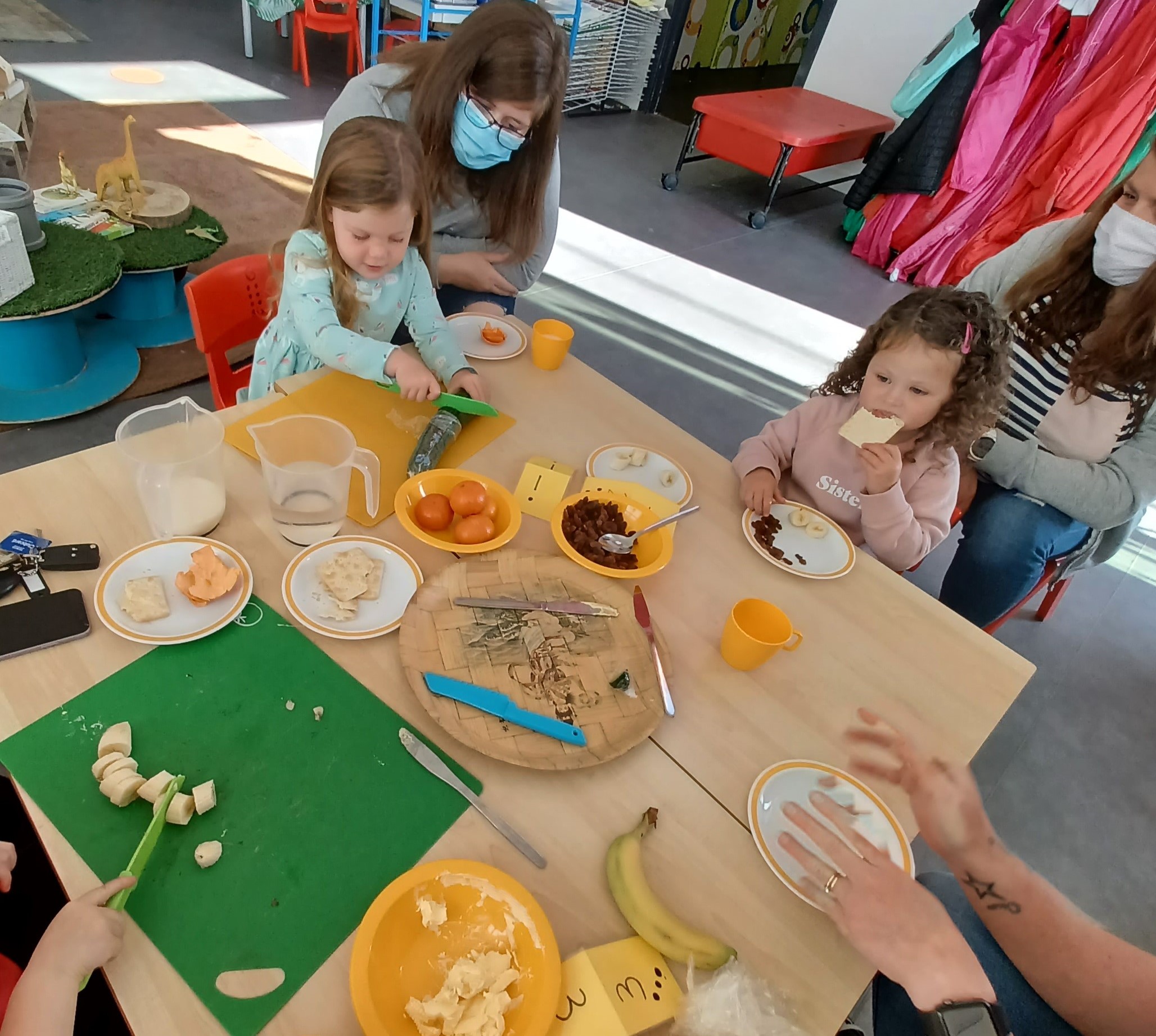 As an Early Years setting (Newton Park Nursery, Wick, Highlands), self-evaluation happens on a daily basis as we work to ensure the opportunities we provide for the children offer high levels of wellbeing and involvement. As Equity and Excellence Leads* we are fortunate to have the opportunity to observe, work with our team to implement changes and network across Scotland with other Equity and Excellence Leads to share good practice.
As an Early Years setting (Newton Park Nursery, Wick, Highlands), self-evaluation happens on a daily basis as we work to ensure the opportunities we provide for the children offer high levels of wellbeing and involvement. As Equity and Excellence Leads* we are fortunate to have the opportunity to observe, work with our team to implement changes and network across Scotland with other Equity and Excellence Leads to share good practice.
Mealtimes – creating an opportunity from a challenge
Through consultation with staff and our own observations it became clear that lunchtime was a stressful experience for all. Staff often felt that the process was rushed, and our own observations showed that the average time the children spent at the table was less than 10 minutes.
We reached out to Gemma Paterson and her team in Falkirk who had embedded the Marvellous Meals approach into a number of Falkirk settings. Their lunch times had a huge emphasis on a nurturing family approach, sitting together, rich conversation and promoting self-help skills.
Linking mealtimes to learning
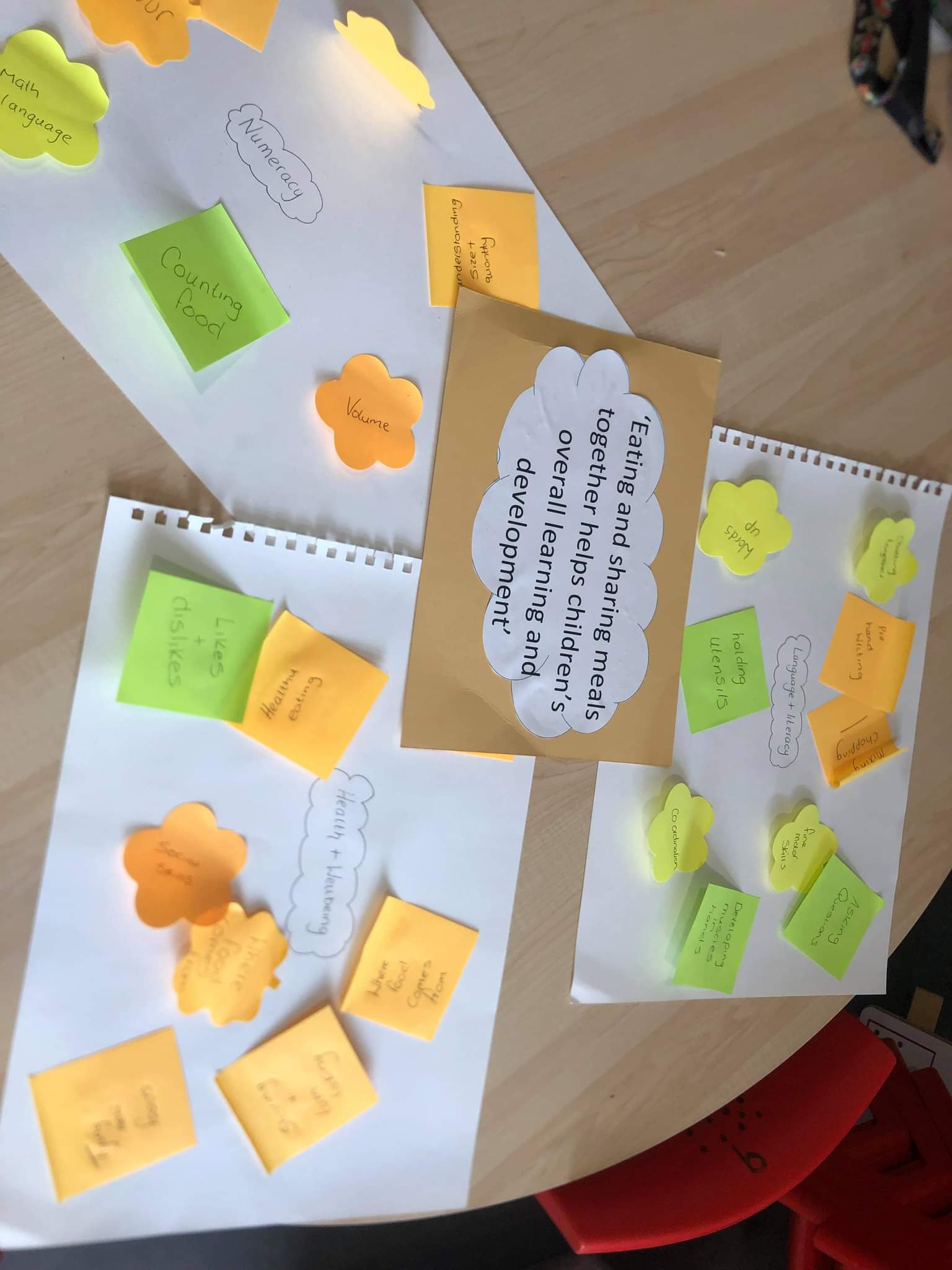 As we began to implement the changes within our setting we quickly realised the huge potential for learning meal times held in regard to speech and language, social development, self help and fine motor skills, as well as the opportunities it opened up for areas of the curriculum such as numeracy and literacy.
As we began to implement the changes within our setting we quickly realised the huge potential for learning meal times held in regard to speech and language, social development, self help and fine motor skills, as well as the opportunities it opened up for areas of the curriculum such as numeracy and literacy.
We began to think - if we as practitioners had not been fully aware of the potential meal times held then maybe our families were not either. Being recently Peep-trained (Peep Learning Together Programme), we were in a great position to reach out to our families to share our exciting project and talk to them about the benefits of a nurturing family mealtime.
We wanted to break the Marvellous meals project in to smaller more manageable chunks focusing on the different areas of learning that family meals times provide. The Peep topics ‘Making the most of mealtimes’, ‘Maths in everyday routines’ and 'Becoming a writer’ linked clearly with the learning that we were now seeing during nursery snack and lunches.
Inviting parents and carers to 3 Peep Marvellous Mealtime sessions
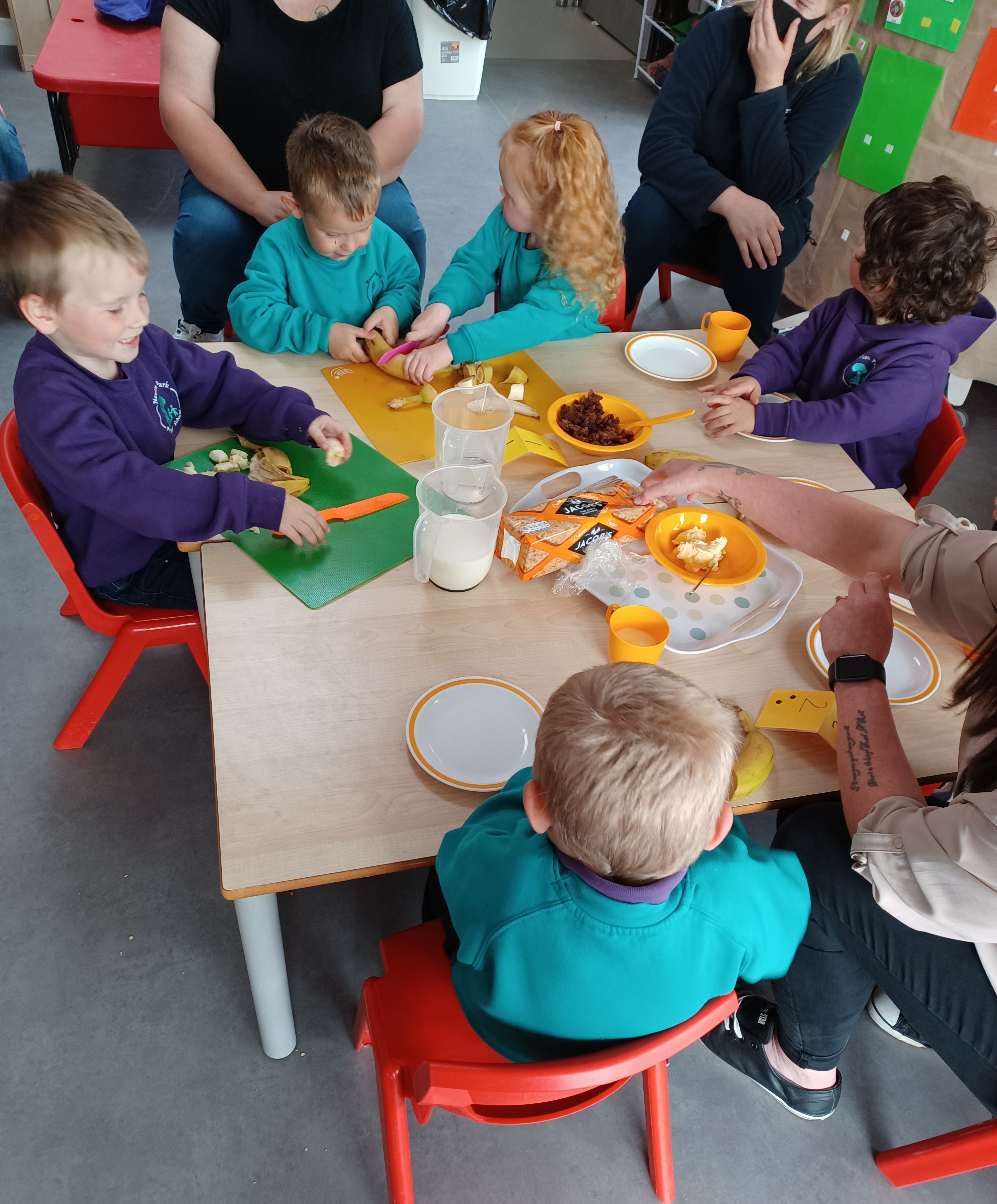 For many of our families this was the first opportunity to visit the setting and get an insight into nursery life in over a year, due to Covid 19. After putting out the invitations and using our ClassDojo as a platform to reach families, we received over 20 families signing up for the 3 planned sessions, a third of our current nursery intake.
For many of our families this was the first opportunity to visit the setting and get an insight into nursery life in over a year, due to Covid 19. After putting out the invitations and using our ClassDojo as a platform to reach families, we received over 20 families signing up for the 3 planned sessions, a third of our current nursery intake.
Taking this on board we felt that the best way to show our families the potential meal times hold for learning and development was to participate in sharing a meal exactly how we do in nursery.
We began the session by welcoming the families with a good morning song and a look at our visual time line. First, we sing good morning, then a special activity and last a story. We included ‘sit together for snack’ as our activity within the Peep ‘Making the most of meal times’ session plan, to give the families an insight into some of the wonderful skills the children were developing as part of the Marvellous meals approach.
Sharing ideas through activities and talk time
As the children washed their hands we introduced our message for the session: ‘Sharing and preparing meals together supports a child’s overall development.’ The families then sat and enjoyed a healthy snack together as the children demonstrated skills such as cleaning the table, washing hands, using real utensils to cut and spread, counting food as they served themselves and of course the rich conversation that happens so naturally at the dinner table.
During the activity as a group we discussed many of the skills we were seeing from the children and how they linked to the early years curriculum or supported the different areas of child development.
Sharing ideas through songs and storytime
Following the discussion we encouraged the group to come back together for a story and a song. We chose the story I don’t like peas which tells the story of a little girl refusing her peas and her mother’s attempts to bribe her. In the end of the story the little girl notices that her mum hasn’t eaten hers either! The moral of the story…. As parents and practitioners, meal times offer the opportunity for us to model many skills while developing children's language and communication.
Feedback and follow-up
At the end of each session we quickly chatted about the topic for the following week, allowing families time to reflect and bring forward any comments and suggestions to the next session. We also provided them with the corresponding PEEP handouts for reading at home, along with other relevant links such as the Highland Emerging literacy website to support and extend the activities within our session into the home environment.
Following the sessions, we asked for family feedback and how they had used the information from sessions in their home environment:
“It was an eye opener to see what my child was capable of at meal time.”
“I really enjoyed the Marvellous meals PEEP sessions, it was really interesting to see that everyday tasks such as chopping their own food and pouring their own drink held so much learning.”
“I had never really thought about how maths and writing skills can be taught at meal times.”
Child comment: “Is Mum coming to nursery again? I will show my brothers what I can do all by myself.”
Following each session we began to receive lovely photos via our ClassDojo app of the children at home developing their independence and helping prepare for meal times at home.
January 2022. Thanks to Equity and Excellence Leads and Peep practitioners Heather Shorrock and Natalie Mackay, and Peep co-ordinator Gillian Forbes
[ * The role of Equity and Excellence Leads is primarily focused on closing the attainment gap in nursery settings in Scotland’s most deprived areas. The EE Leads are teachers or early years graduates, working with the children (but not in the adult-child ratio) and their families, and helping to upskill fellow practitioners. Find out more in the Care Inspectorate findings report focusing on Equity and Excellence Leads (March 2021), including an example of Peep being used in a Dumfries and Galloway nursery.]
Feature box colour:
find out more or book training
tel 01865 397 970
training@peeple.org.uk
> programmes
> training courses
> dates & booking
> sign up to our e-newsletter
